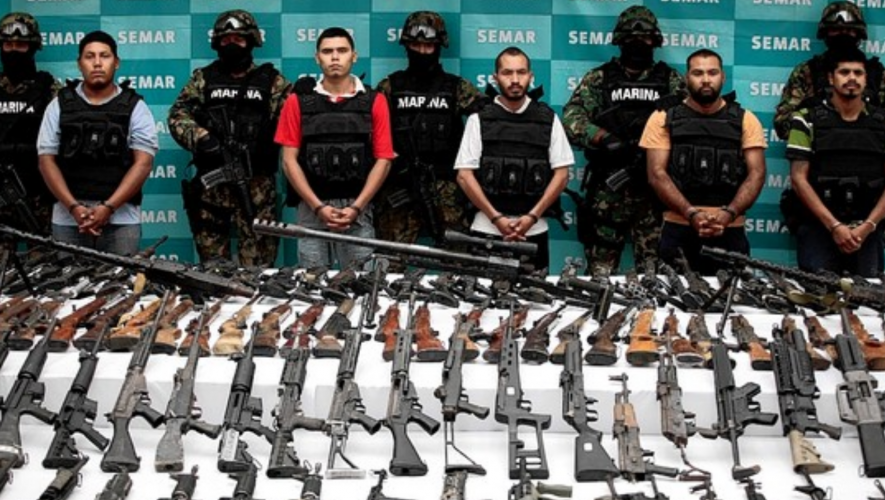Iron and blood. That’s what the decade-long firearm conflict between the US and Mexico boils down to.
Every thirty-one minutes, Mexican criminal groups use American-made guns to carry out criminal activities. The country’s homicide rate in 2020 hit an all-time high of 36,579 cases, or 29 deaths per 100,000 people. It would not be a stretch to call it an epidemic; America’s high firearm inventories and lenient gun legislation only exacerbate the issue.
Once Mexican criminal groups access American-made assault weapons, they smuggle the arms across the border and use them to murder innocent people. Mexican drug cartels are making billions of dollars from firearm trafficking, turning into the lifeblood of US gun manufacturers.
While corruption is a major cause of criminal activity in Mexico, American gun manufacturers are fueling much of the gun violence happening in the country.
US border control policy is largely egotistical: the US builds walls and passes xenophobic policies to strengthen border measures preventing immigrants from entering while neglecting its responsibilities to restrict the overflow of American arms that cross over the border.
Ironically, Mexico’s gun control laws are some of the most impermissive in the world. There is only one gun store in the whole country—a military-run establishment in Mexico City. The guns are expensive and selection is limited. Additionally, the state prohibits person-to-person firearm sales, and requires background checks on prospective buyers that take over six months and a complete evaluation of the buyer’s employment history. The complexity of obtaining a gun in Mexico explains the high demand for smuggled guns produced in the US.
For decades, Mexican officials have blamed cursory US gun control for the blood spilled within its borders. In August, the Mexican government took it a step further by filing a lawsuit in American courts against major US arms manufacturers and distributors for damages caused by illegal arms trafficking.
The government’s rationale for filing the recent lawsuit is that controlling firearm trafficking will reduce the homicide rate. While the case is unlikely to translate to tangible conclusions anytime soon, Mexico’s lawsuit carries a political message: the US should acknowledge it is complicit in the decade-long surge in Mexican gun violence and the killing of thousands of innocents.
Drugs and Crime in Mexico
Mexico’s homicide rate last year was at an all-time high. Comparatively, the US homicide rate in 2019 was much lower at 5.8 deaths per 100,000 people. To put it in perspective, between 2007 and 2014, more than 164,000 Mexicans were victims of homicide; this is more than the combined US casualties in the Afghan and Iraq wars. Mexican government agencies have gone as far as to attribute 55 percent of all homicides to Mexican cartels and the drug trade. Others have pointed out that the root cause of a decrease in life expectancy for Mexican men was the high homicide rate.
Mexico’s present criminal activity directly results from the unchecked corruption that plagues the country. The high criminal activity in Mexico stands out internationally; drug trade and related crimes are routine and paltry crimes such as theft, extortion, and fraud are reported frequently.
Nevertheless, American gun manufacturers are responsible for much of the gun violence in Mexico; the US manufactured guns accounted for somewhere between 70 to 90 percent of the 106,000 recovered firearms over five years. Gun companies have enjoyed broad immunity from these deaths for far too long. These trafficked guns exacerbate Mexico’s crime problem, and the U.S. should no longer overlook its complicity.
American authorities are fully aware of arms trafficking but have neglected to implement preventive policies. The country’s unique gun violence issue has likely played a role in this negligence. The trafficking of firearms into Mexico also poses a national security threat for the US: facilitating the drug trade and fueling organized crime.
The Inspection Issue
Hundreds of trafficking syndicates smuggle thousands of weapons across the border on the so-called “Iron Pipeline,” a frequented route crossing through Southern states. Smugglers routinely enlist American citizens with clean criminal records, allowing them to buy several arms from different producers at once and drive them across the border. At other times, illegal straw purchasers—those buying the guns for criminal groups—acquire weapons through unregulated gun shows. From there, most guns pass undetected through Mexican customs.
Necessary regulation of gun exports from the US has consistently fallen short. The Directorate of Defense Trade Controls and the Department of Commerce must only notify Congress of sales exceeding $1 million. Reports from the Bureau of Alcohol, Tobacco, Firearms, and Explosives (ATF) and the Government Accountability Office have consistently affirmed that close to 70 percent of guns recovered at Mexican crime scenes originate from the US and go undetected by border security. In 2020, ATF also approved most license applications, which failed to meet safety standards in many cases. Better regulation will undoubtedly control the flow of guns.
Today, only seventeen American states demand a state license to purchase a firearm, and only two mandate regular inspection of dealers. Proponents of firearms regulation encourage Congress to pass legislation creating strong, enforceable laws against federal gun trafficking and straw purchasing. Others suggest enhanced oversight of dealers by law enforcement, as well as the screening of firearm purchases. Both could aid in the enforcement of private sales regulations and reduce trafficking by providing a chain of firearm ownership which could facilitate tracing. Demanding the constant renewal of firearms licenses by statute or through regulation by the ATF will also bolster oversight.
Immigration debates at the forefront of the legislative agenda
While the US government prioritizes efforts against drug smuggling on the southern border, efforts on regulating firearm sales and firearm trafficking have been largely futile. Gun control and immigration policy are not simply drivers of polarization, but also reinforce political factions that inhibit bipartisan solutions.
Politicians, such as former President Donald Trump and Senator Ted Cruz, garner public support through conservative gun policy advocacy and advancing hostile immigration legislation. For decades, the executive and legislative branches have worked together to allocate larger budgets for border patrol, new physical barriers, and reforms to reduce border crime and illegal immigration. Therein lies the egotism—these politicians aim to bolster the southern border against immigrants, all whilst letting weapons slide over with ease.
From the earliest days of Trump’s campaign, he voiced the need to protect the country from foreign threats, particularly crimes allegedly committed by immigrants. The deprecatory notion that the US should restrict immigration and close its borders to protect the country against violent crime underpinned the Trump administration’s nativist, isolationist, and nationalist immigration rhetoric and policy. However, even though immigration and firearm trafficking take divergent paths—as immigrants flee north to cross the border, guns go south—they are interconnected.
Violence arising from the war on drugs leads to the displacement of millions of families in Latin America. Sixty-two percent of all migrants arriving at the border report exposure to violent situations in their home country; seventy-five percent said that violence, including forced recruitment by drug gangs, was their reason for leaving. And while Biden campaigned on plans to “do better to uphold our laws humanely and preserve the dignity of immigrant families, refugees, and asylum-seekers,” the vast majority of migrants are turned away at the border.
The lawsuit neutralizes the decade-long argument: while Mexico is partly responsible for the violence and corruption, the US is a complicit actor.
The Lawsuit and the Law
For the first time in history, a single lawsuit names weapon manufacturers, drug cartels, and their victims on a single document. Mexico’s ten billion dollar lawsuit accuses prominent US gun manufacturers such as Smith & Wesson, Barrett, Ruger, and Colt of facilitating unlawful gun trafficking to Mexico. It cites dozens of media reports, academic investigations, and government briefs to show that US-manufactured weapons, marketed to appeal to Mexican criminals, are bought and sold in the Mexican criminal market. The lawsuit, which may appear as another source of tension in the bilateral conflict, could benefit both parties.
The US blames the drug war on Mexico’s ineffectiveness in controlling the trade of the drug cartels in their country. This lawsuit is likely to shift the narrative by picking up media coverage and propelling gun trafficking to the front of the White House agenda.
Biden often advocates for the regulation of domestic gun purchases. In fact, his plans to reimplement the assault weapon ban and enact new and more stern measures align with the legislative priorities of both the US and Mexican governments. However, partisanship continues to fractionate Americans’ views on gun control.
To some Americans, firearms hold cultural and economic importance granted by natural law and upheld by the Supreme Court. Numerous cases that challenge gun control measures for violating the Second Amendment—which explicitly gives Americans the right to keep and bear arms—have reached the nation’s highest courts. Hunting sports, shooting at the range, and collecting guns are cherished American traditions. Additionally, many regions across the country consider guns important economic drivers, whether it be tourism or simply in terms of employment.
So far, the administration has largely focused on gun control in response to mass shootings, overlooking the critical issue of trafficking. Additional steps are desperately required, from enhancing accountability to installing preventive measures exclusively directed to border firearm trafficking.
Whether out of lack of capacity or integrity, Mexico cannot resolve the firearm epidemic alone. As the other complicit party, the US must be willing to cooperate and assist its neighbor in this uphill battle. While stopping illegal firearm trafficking isn’t enough to end all of Mexico’s deep-rooted issues, it is time for Biden and Mexican authorities to recognize gun-trafficking reform will save Mexican and American lives.



